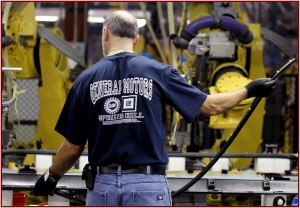
Ray Smith works on the sub-assembly of A-pillars for the Chevrolet Traverse at Spring Hill Stamping plant.
General Motors announced today an investment of $183 million for a future mid-size vehicle to be built at Spring Hill, Tennessee. Neither timing, nor product line was announced, but GM claimed that an additional 1,090 hourly and 106 salaried positions would be created.
Furthermore GM claimed the Spring Hill plant would be capable of building any GM car or crossover vehicle, a potential breakthrough AutoInformed is attempting to clarify. It turns out that the plant can build anything it is tooled for – a circular argument, which would apply to any plant. GM says that what makes “Spring Hill ultra flexible is the ease in exchanging the tooling.” Ok so it’s a modern plant.
In September, GM had announced it would reopen the shuttered Saturn plant in Spring Hill as part of a successful job creation promise to get its new cost cutting UAW contract approved. Accordingly the Chevrolet Traverse will go into production there next year. Back then GM said it would to build two new mid-size vehicles. At the time one program was a $61 million deal with 600 jobs; another was a $358 million investment with 1,110 jobs created by the UAW’s accounting. (See GM UAW Contract Offers Profit Sharing, Some New Jobs)
“Together, we are bringing 1,800 jobs to Tennessee,” said Bob King, UAW president. The Saturn plant closed two years ago at Thanksgiving time as Gm struggled to emerge from bankruptcy. (See UAW Reaches Agreement with GM. Members Vote This Week)
Spring Hill operators will ultimately be capable of building a variety of products on a range of platforms – covering for plants being retooled for new products and also allowing real-time reaction to sales spikes in a given car or crossover, GM said in a release.
Spring Hill powertrain and stamping operations, part of the integrated complex that was the home to the now dead Saturn brand from 1990 to 2007 and the Chevrolet Traverse large crossover into 2009, are still operating producing pieces for many GM products including the Traverse. GM says it has invested $515 million in the engine operations in the last 14 months for current and next-generation Ecotec 4-cylinder engine production.

